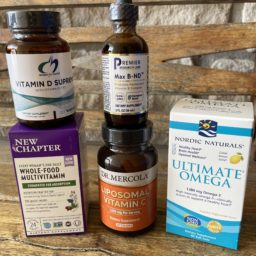If you eat right and exercise, do you really need to take vitamins? The answer to this common but complicated question lies within a slightly larger question…how truly healthy are you and your habits? When you think about it, are you healthy, or just not sick? Most people have not had sensitive health outcomes measured, but merely basic testing that shows the absence of disease. In 2016, a Mayo Clinic study concluded that less than 3% of Americans met basic health qualifications.
Why do very few Americans have a high degree of health? Well, inherent nutritional depletions within our food coupled with the ease with which gut inflammation occurs create the impossibility for sustained, balanced nutrition. Additionally, chronic stress depletes digestion. Despite our best efforts, most of us face real challenges with nutritional absorption and/or poor quality food. Health habits like stress and mood management, sleep hygiene, exercise (including stretching), and healthy food choices compete with our unhealthy vices, like emotional eating, screen time, a sedentary lifestyle, and sleep deprivation.
These harsh realities create the inevitable need to support our health with periodic supplementation. That said, most people don’t need spoonfuls of daily capsules. Here are 5 must-haves for creating and maintaining a basic supplement routine.
1. Daily Multivitamin or at least a good B-Complex. You can’t out-supplement a bad diet! If you expect health because you take multivitamins but still consume pizza and beer, as your friends, we’re here to tell you this is not sound logic. Conversely, if you are trying to get all of your nutrition out of food, this is also limiting–we just don’t eat perfectly. Taking a daily multivitamin or basic B-Complex helps when you skip breakfast, eat a quick lunch over the sink, or have inflammation for dinner.
2. Vitamin D. Many chronic pathologies and immune system vulnerabilities begin with low vitamin D levels. Have your values tested at least once, if not twice a year, especially going into winter’s flu season. A common mistake is dosing vitamin D without knowing your lab values. Your blood levels will determine just how much to take.
3. Vitamin C. One of the most supportive vitamins for the immune system is Vitamin C. In 1970, Dr. Linus Pauling, a Nobel-Prize winning chemist, proposed taking 1,000-2,000 mg per day to prevent the common cold. Nowadays, various forms of vitamin C (Liposomal C is the highest concentration you can absorb) can improve immune outcomes even more. These megadoses simply cannot be obtained by diet alone. In the face of a novel pandemic, vitamin C is pivotal. A recent study observed lower sequential organ failure and lower inflammatory markers when COVID patients were administered vitamin C.
4. Fish oil. Omega 3-fatty acids provide structure to cell membranes to improve cell health and signalling, and optimize brain and nerve function. Essential fatty acids are rich in anti-inflammatory mediators that reduce pain and swelling.1 Why supplement? If we ate fish as frequently as most people eat chicken for meals, then dietary intake may meet the need. This isn’t usually the case however, so a good, concentrated fish oil is needed. Hate the fish oil burps? Peoples carries a wide-range of burpless formulas!
5. Probiotics. Many circumstances exist that deplete our gut flora. A robust, diverse flora is needed to maintain bowel transit time, reduce gut inflammation, metabolize vitamins and neurotransmitters, and digest food. The most common reasons probiotics are depleted in our digestive tracts are antibiotics, the standard American diet, stress, and GMO foods. Eating fermented foods like sauerkraut, kimchi, tempeh, and miso don’t typically happen regularly in our diets. While people claim they are eating yogurt, often the yogurt sources contain too much sugar and too little probiotics to be effective. A simple tip to remember is that yogurt should taste sour to really be useful as a probiotic source. Diversify your gut flora by rotating through probiotics.
The knowledgeable wellness team at Peoples Rx are well-versed in helping you choose the right quality supplements for your needs! Everyone is different and requires unique guidance. These needs also change with different circumstances. Diet is paramount. Don’t ever give up on healthy nutritional changes, but know that adding just a few basic supplements will make a big difference in your overall health.
 Some of our favorite foundational supplement options are on sale this month!
Some of our favorite foundational supplement options are on sale this month!
New Chapter – all products 15% off
Dr. Mercola – all products 25% off
Nordic Naturals – all products 20% off
(These promotions expire 1/31/21.)
 Amy Nelson, ND* received her Naturopathic Doctorate from the National College of Natural Medicine in Portland, OR where she studied nutrition, homeopathy, herbal and functional medicine. In addition, Dr. Nelson was the Associate at The IBS Treatment Center in Santa Monica where she treated irritable bowel syndrome and complex food allergies. Dr. Nelson utilizes her experience in natural medicine to address female and male hormonal imbalances, mental health, and digestive disorders.
Amy Nelson, ND* received her Naturopathic Doctorate from the National College of Natural Medicine in Portland, OR where she studied nutrition, homeopathy, herbal and functional medicine. In addition, Dr. Nelson was the Associate at The IBS Treatment Center in Santa Monica where she treated irritable bowel syndrome and complex food allergies. Dr. Nelson utilizes her experience in natural medicine to address female and male hormonal imbalances, mental health, and digestive disorders.
*Naturopathic Doctors are not currently licensed in the state of Texas.
If you have comments and/or questions about this blog, email us at blog@peoplesrx.com.
1. Calder PC. Omega-3 fatty acids and inflammatory processes. Nutrients. 2010;2(3):355-374. doi:10.3390/nu2030355
